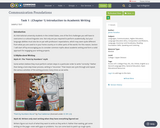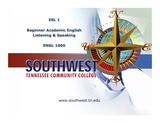
- Author:
- Rachel Mixson
- Margie Dernaika
- Linda Patterson
- Jessica Miller
- Janet Rosenthal
- Chris Hastings
- Date Added:
- 12/03/2021

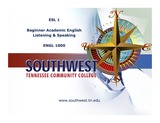
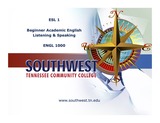
Introduction of past tense and past progressive tense for beginning level academic English.
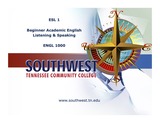
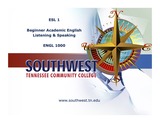
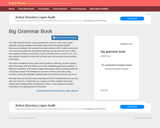
** This book has been donated to the public domain.**
From the introduction:
Hello there . . . ! Welcome to English Banana.com’s Big Grammar Book. It’s the third fantastic book from English Banana and the aim this time is to practise grammar, grammar and, er, more grammar!
It’s jam-packed from cover to cover with a great selection of photocopiable worksheets taken from the popular English Banana.com website. We wanted to provide teachers with a really useful book of no-nonsense grammar worksheets that they can dip into and use in class with students at Entry Level (ESOL Core Curriculum Entry Levels 1 & 2). It is also ideal for students to work with at home since the answers are all printed at the back.
The book is divided into four parts and is graded in difficulty, so that it begins with some basic stuff and builds up to more challenging grammar activities. It features a selection of Essential English worksheets which provide practice for crucial basic areas of knowledge for learners at Entry Level, like using numbers, writing the alphabet, spelling days and months correctly, and so on.
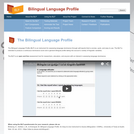
There is great need to understand individuals' functional language abilities, not only in education but in commerce and public policy discussion. The aim is to quantify language use patterns, proficiency, and dominance in the two languages of bilinguals. The Bilingual Language Profile (BLP) is an instrument for assessing language dominance through self-reports that is concise, quick, and easy to use. The BLP is intended to produce a continuous dominance score and a general bilingual profile taking into account a variety of linguistic variables. The BLP is an open and free assessment tool for researchers, educators, and anyone with an interest in assessing language dominance.

Blend phonemes and practice long "i" sounds with NYCDOE Universal Literacy Reading Coach Anna Scretching-Cole. Students will practice blending and reading with the long "i" sound with a focus on the "igh" and "-y" spelling.
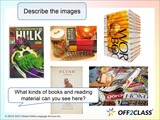
Are you looking for a fun lesson to help your students practice speaking and expand their vocabulary? This lesson introduces vocabulary around books and reading and provides an opportunity for students to practice their speaking skills.You access 150+ more free lessons like this with a free Off2Class account!
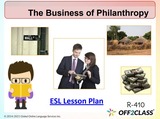
For upper intermediate language students looking for a new challenge, this ESL Lesson Plan on the Business of Philanthropy offers an excellent reading activity.This lesson plan from the Off2Class library provides a nuanced look into the world of philanthropy (e.g. charities, donations) and the business aspects that surround the industry. The lesson also includes several warm-up activities (prior to the reading text) and basic comprehension questions (after the reading text).If you want additional lesson plans and support, including teachers’ notes, be sure to register for a free Off2Class account.
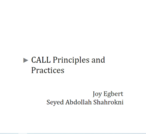
Since the first version of this book came out in 2005, the field of computer-assisted language learning (CALL) has grown and changed. This update is the result of some of those changes. Our intent is to place pedagogical goals before technologies, as the literature advises but is not always followed in classrooms. In revising this book, as in the original, we assume that good teachers teach well because they bear in mind certain principles about how they can best help learners to learn language. Placing these principles at the center of attention makes it much easier for teachers to concentrate on the question of what constitutes effective computer-enhanced pedagogy and why.
This book takes as its organizing principles both the system of conditions that are known to support effective language learning and the goals that a variety of standards in the field have set out for us and our students.
Examples throughout the book underscore the need to consider theory in every aspect of the teaching and learning process. Some of the points in this book we have made in other places; other we discovered during the revision process. All told, this text provides a brief picture of what CALL classrooms can be like today. Of course, that could change tomorrow.
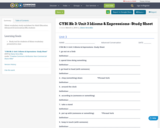
Idiom vocabulary study worksheet for Adult Education Advanced (Conversation) ESL students

This adaptation of Charles Dickens' A Christmas Carol is written as a graded reader for ESL/EFL/ELT purposes. The text is estimated to be at the INTERMEDIATE level on the Extensive Reading Foundation Grading Scale, or A2 on the CEFR scale. (PDF, epub, mobi)
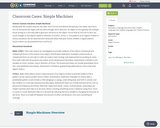
Science Content Storyline: Simple MachinesBriefly write the content story for the topic: PS2.A Forces and Motion Disciplinary Core Ideas: Each force acts on one particular object and has both strength and a direction. An object at rest typically has multiple forces acting on it, but they add to give zero net force on the object. Forces that do not sum to zero can cause changes in the object’s speed or direction of motion. (3-PS2-1). The patterns of an object’s motion in various situations can be observed and measured; when that past motion exhibits a regular pattern, future motion can be predicted from it.(3-PS2-2)Educational StandardsNGSS: 3-PS2-1. Plan and conduct an investigation to provide evidence of the effects of balanced and unbalanced forces on the motion of an object. [Clarification Statement: Examples could include an unbalanced force on one side of a ball can make it start moving; and, balanced forces pushing on a box from both sides will not produce any motion at all.] [Assessment Boundary: Assessment is limited to one variable at a time: number, size,or direction of forces. The assessment does not include quantitative force size, only qualitative and relative. Assessment is limited to gravity being addressed as a force that pulls objects down.]3-PS2-2. Make observations and/or measurements of an object’s motion to provide evidence that a pattern can be used to predict future motion. [Clarification Statement: Examples of motion with a predictable pattern could include a child swinging in a swing, a ball rolling back and forth in a bowl, and two children on a see-saw.] [Assessment Boundary: Assessment does not include technical terms such as period and frequency.]Summary: Machines make work easier. Levers, inclined planes, and pulleys are simple machines that help us to do work. Work is moving something across a distance using force. Force is a push or a pull. Machines help us to do work by reducing the force needed or changing the direction of the force. There is a trade-off between the amount of effort and distance. (You can’t something for nothing!)

Science Content Storyline: Simple MachinesBriefly write the content story for the topic: PS2.A Forces and Motion Disciplinary Core Ideas: Each force acts on one particular object and has both strength and a direction. An object at rest typically has multiple forces acting on it, but they add to give zero net force on the object. Forces that do not sum to zero can cause changes in the object’s speed or direction of motion. (3-PS2-1). The patterns of an object’s motion in various situations can be observed and measured; when that past motion exhibits a regular pattern, future motion can be predicted from it.(3-PS2-2)Educational StandardsNGSS: 3-PS2-1. Plan and conduct an investigation to provide evidence of the effects of balanced and unbalanced forces on the motion of an object. [Clarification Statement: Examples could include an unbalanced force on one side of a ball can make it start moving; and, balanced forces pushing on a box from both sides will not produce any motion at all.] [Assessment Boundary: Assessment is limited to one variable at a time: number, size,or direction of forces. The assessment does not include quantitative force size, only qualitative and relative. Assessment is limited to gravity being addressed as a force that pulls objects down.]3-PS2-2. Make observations and/or measurements of an object’s motion to provide evidence that a pattern can be used to predict future motion. [Clarification Statement: Examples of motion with a predictable pattern could include a child swinging in a swing, a ball rolling back and forth in a bowl, and two children on a see-saw.] [Assessment Boundary: Assessment does not include technical terms such as period and frequency.]Summary: Machines make work easier. Levers, inclined planes, and pulleys are simple machines that help us to do work. Work is moving something across a distance using force. Force is a push or a pull. Machines help us to do work by reducing the force needed or changing the direction of the force. There is a trade-off between the amount of effort and distance. (You can’t something for nothing!)
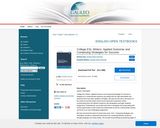
College ESL Writers: Applied Grammar and Composing Strategies for Success is designed as a comprehensive grammar and writing etext for high intermediate and advanced level non-native speakers of English. We open the text with a discussion on the sentence and then break it down into its elemental components, before reconstructing them into effective sentences with paragraphs and larger academic assignments. Following that, we provide instruction in paragraph and essay writing with several opportunities to both review the fundamentals as well as to demonstrate mastery and move on to more challenging assignments.
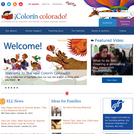
This site is designed for parents and teachers who are helping Spanish-speaking children learn to read in English. Find activities to help children learn about sounds, letters, and words. Use tips and materials to help children develop skills in reading. (Available in English and Spanish.) This site is filled with useful information, strategies, activities, and resources for all teachers of ELLs, whether you are an ESL teacher or a content area teacher with one or two English learners in your class. Although many of the activities have been designed for children in PreK-3, most can be adapted for children in upper elementary, middle school, and high school.
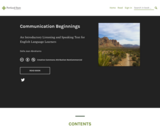
An Introductory Listening and Speaking Text for English Language Learners
Short Description:
For more accessible and classroom-friendly (Word and PDF) versions of this book, please view and download them at PDXScholar. This Pressbook version primarily exists to encourage others to adapt and adopt Communication Beginnings: An Introductory Listening and Speaking Text for English Language Learners using Pressbooks. This textbook is designed for advanced beginning-intermediate English language learners in an academic English program.
Long Description:
Communication Beginnings: An Introductory Listening and Speaking Text for English Language Learners is designed for advanced beginning-intermediate English language learners in an academic English program. It is composed of 7 chapters, each of which covers specific speaking and listening learning objectives and includes dialogues, interviews, discussions and conversation activities. Each chapter also focuses on 10 target words from the New General Service List of English vocabulary and reviews basic grammar points. The textbook includes an audio component that consists of recorded conversations of native and non-native English speakers, as well as links to additional listening resources on the web.
Word Count: 16252
(Note: This resource's metadata has been created automatically by reformatting and/or combining the information that the author initially provided as part of a bulk import process.)
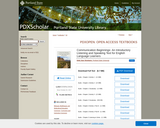
This textbook is designed for beginning-intermediate English language learners. It is composed of 7 chapters, each of which covers specific speaking and listening learning objectives and includes dialogues, interviews, discussions and conversation activities. Each chapter includes listening and speaking components such as dialogues, interviews, discussions and conversation activities. Each chapter also focuses on 10 target words from the New General Service List of English vocabulary. The textbook includes an audio component that consists of recorded conversations of native and non-native English speakers, as well as links to additional listening resources on the web.
